Contents
The benefits of eating onions are vast. Many of us have cried when tackling this vivacious bulbous plant. According to Andres de Laguna, a Spanish physician of the 16th century, women used it “when, unable to cry, wanted to provoke tears to move their husbands.” Professionally hired mourners also used onions.
Indeed, neither these nor others were conscious of the tremendous benefits of eating onions. Ancient Egyptian, Roman, Greek, and Babylonian physicians knew about their properties and widely employed the onion as a medicinal plant.
The Spanish saying “with you, bread and onion” refers to this edible bulb’s apparent humbleness and simplicity. However, modern biochemical research has discovered the extraordinary medicinal benefits of eating onions. It is an antibiotic, antidiabetic, aphrodisiac (despite its smell), and even prevents intestinal cancer. It is a fundamental element of the Mediterranean diet, raw in salads and the most diverse cooked meals, always dressed with good olive oil. Eating an onion a day gives abundant health. Though preparing it may make us cry, it will make us laugh and feel happy in the future.
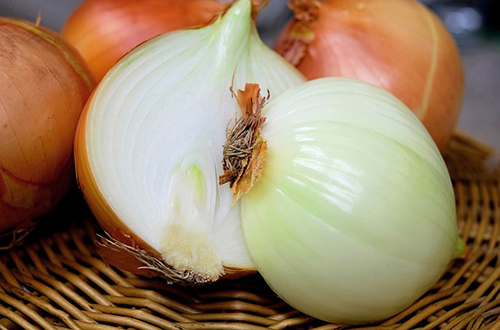
Healing Properties and Benefits of Eating Onions
The plant contains a volatile essence rich in sulfured glycosides, such as allyl propyl disulfide, the most important. To this essence, the onion owes most of its properties. It also contains plenty of enzymes, with dynamic action on the digestion and metabolism, trace elements (sulfur, iron, potassium, magnesium, fluoride, calcium, manganese, and phosphorous), vitamins (A, B complex, C, E), flavonoids of diuretic action, and vegetal hormone with antidiabetic activity, the glycoquinine.
The healthy and healing virtues of the onion are like those of the garlic, which, instead of allyl propyl disulfide, contains a similar substance, allyl disulfide. The properties of the onion are the following:
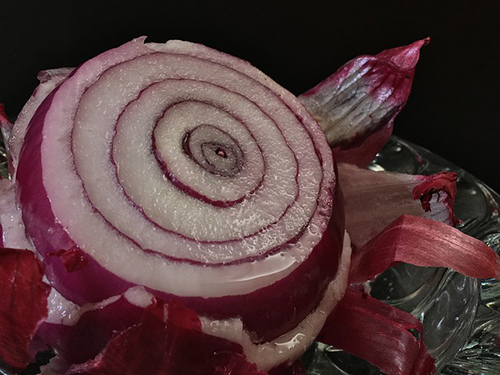
- Antibiotic. Raw onion juice is a proper antibiotic with proven activity against bacteria that usually provoke skin infections, including golden staphylococcus. Thus, it is used to heal wounds and furuncles (infected spots), abscesses, burns (avoiding their infection), skin wrinkling, and acne. In all these cases, it is externally applied, mashed into a poultice, or a lotion with fresh juice or in compresses. To ripen abscesses, use a hot dressing of boiled or grilled onion.
- Expectorant and pectoral. Because it is antibiotic, mucolytic, and anti-inflammatory, it is an ideal remedy for respiratory afflictions: respiratory catarrh, sinusitis, pharyngitis, laryngitis, bronchitis, cough, bronchial asthma, and lung emphysema. Onion syrup with honey is a traditional method of administration in these cases. Gargling with onion broth reduces the inflammation of the pharynx and is very useful for tonsillitis (sore throat).
- Hypotensive, diuretic, depurative. It is highly recommended for people suffering from high blood pressure, obesity, rheumatism, arthritis, gout, and kidney ailments. It is also suitable for albuminuria, nephrosis, and the retention of liquids, sand, and urinary stones. It notably alkalizes the urine pH, thus promoting the elimination of uric acid and other metabolic, toxic waste.
- Blood-thinning. One of the top benefits of eating onions is its effect on people with thrombosis, making blood more fluid and flow better. This benefit is proven: the onion contains fibrinolytic substances, which break up blood clots and prevent excessive formation. It has also been proven that onion acts as a platelet anti-gatherer, preventing the extreme propensity of the platelets in the blood to gather, forming thrombi or clots.
- Vermifuge. One of the many benefits of eating onions is that they are helpful against pinworms and the small white worms that cause itching in children. In this case, onions should be eaten raw.
- Hypoglycemic. Due to the action of glycoquinine, the glucose level in the blood decreases. As a complement to the treatment of diabetes, it allows a reduction of the insulin dosage or that of antidiabetic medicines.
- Digestive and general stimulating of the body. It boosts all digestive secretions (gastric, intestinal, pancreatic), thus improving the digestion and the assimilation of meals. Therefore, people suffering from hyperacidity or gastric and duodenal active ulcers should not use it. Onions stimulate metabolic and detoxifying liver functions and should be enjoyed by anyone suffering from hepatic disorders, such as persistent hepatitis, cirrhosis of the liver, fatty degeneration of the liver, or hepatic inefficiency.
Thanks to its antiseptic and antibiotic activity, it normalizes intestinal flora by decelerating the rate of the putrefaction process, in which highly irritant, toxic substances such as indole and skatole are released. These substances increase the growth of cancers in the colon and the rectum; hence, one of the most important benefits of eating onions is the preventative effect on intestinal cancer.
The onion’s exhilarating action is due to its enzymes stimulating blood production and energizing metabolism. It also provides trace elements and iron. Its purported aphrodisiac effect would be due to the typical revitalization it produces.
- In cosmetic and external applications, onions stimulate hair growth, soothe and beautify skin, and clean acne-prone skin. A combination of exterior and internal uses is recommended for best results.
Benefits Of Eating Onions: Juice
Onion juice is mainly used as an expectorant and a diuretic. However, for centuries it has been used to treat spasms and worms. It has gas-dispelling properties and is a general tonic that tones the stomach. As an antiseptic, onion juice helps to eliminate fermentation and putrefaction processes in the gastrointestinal tract. It is also advantageous in lowering blood pressure and strengthening the heart. When combined with honey, it is suitable for coughs and hoarseness.
In external applications, onion juice can be placed on festering wounds.
WARNING: According to a study done in California, volunteers discovered that heavy and prolonged use of onion oil resulted in severe iron anemia.
Onion juice: Take one teaspoon three to four times a day. Cold Extract: Soak a chopped onion in one cup of water for twenty-four hours, strain, and take ½ cup daily. Decoction: Boil a medium-sized, chopped onion in more than a cup of water until one cup of liquid remains. Take one tablespoon several times daily for several days.
Benefits of Eating Onions: Best Results
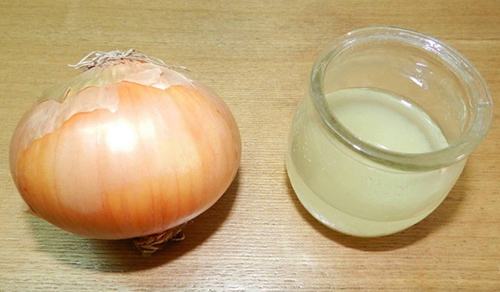
- Raw. Whenever you can, and if your stomach can stand it (make sure to use it in progressive doses). It is best to eat the onion raw to increase its effectiveness. It is mainly eaten grated or sliced in a salad with lemon juice and oil. A medium-sized onion a day is the recommended therapeutic dose. However, the maximum amount depends on your tolerance.
- You can make fresh juice by grinding the bulb in a blender and mixing it with carrot juice, honey, lemon, or tomato. This concoction can be taken in spoonfuls or half a glass twice to thrice daily.
- Boiled or grilled onion. The acid and sour taste are not present when taken this way; therefore, the stomach will better tolerate it. Unfortunately, you will lose a little of the active components responsible for the onion’s antibiotic effect. Boiled or grilled onions can be eaten in large amounts without risk of rejection. When you cook onions in water, the broth is highly nutritious and should be consumed. The minimum dose recommended when consuming boiled or grilled onions for medicinal uses is 2 to 3 onions daily with the broth.
- Onion syrup.
- Apply the fresh juice on your skin as a wet compress or a lotion.
- Boiled onion compresses are beneficial for ripening furuncles and abscesses. Applying a boiled onion to the skin also renders excellent results.
- Gargle with the broth obtained by boiling the onions.
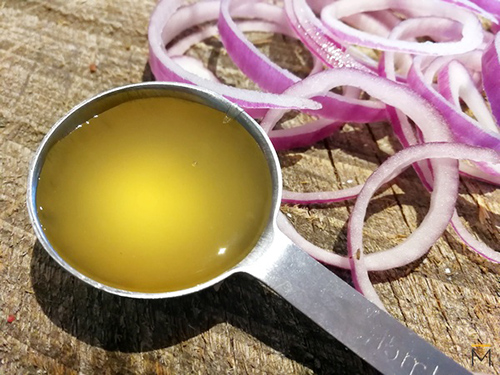
Benefits of Eating Onions: Scientific Facts
- French: Oignon.
- Spanish: Cebolla.
- Environment: Native to Iran and the Middle East, it is widely spread and farmed worldwide.
- Description: A vivacious bulbous plant of the Liliaceae family, it can grow up to one meter high. During its first year of life, it forms the bulb, and during the second, the stem grows, the plant blooms, and it produces fruit.
- Parts of the plant used medicinally: The bulb.
Sea Squill
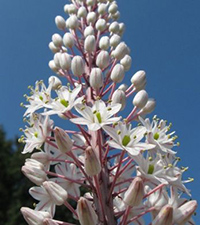
A variety of wild onions grows in the coastal regions of Europe. Its bulb is not wholly underground like the common onion, drawing attention. The common name is sea squill.
Sea squill contains escilacarenes, a glycoside substance with cardiotonic action similar to the foxglove plant. It was used in ancient times as an alternative to foxglove treatments in dosages from 0.5 to 0.7 g of ground bulb per day. Higher doses produce nausea, vomiting, arrhythmia, and even heart failure. Thus, it is regarded as a toxic plant that must always be used under medical supervision.
DISCLAIMER: All content on this website is presented solely for educational and informational objectives. Do not rely on the information provided as a replacement for advice, diagnosis, or treatment from a qualified medical expert. If you are pregnant, nursing, or have any preexisting medical concerns, talk to your doctor before using any herbal or natural medicines.
REFERENCES
- George D. Pamplona-Roger, M.D. “Encyclopedia of Medicinal Plants.” George D. Pamplona-Roger, M.D. Encyclopedia of Medicinal Plants. Ed. Francesc X. Gelabert. Vols. 1 San Fernando de Henares: Editorial Safeliz, 2000. 294, 295, 296. Print.[benefits of eating onions]
- Vance Ferrell Harold M. Cherne, M.D. The Natural Remedies Encyclopedia [Book]. – Altamont, TN: Harvestime Books, 2010. – Vol. Seventh Edition: 7: pp. 171.
- WebMD: https://www.webmd.com/diet/health-benefits-onions
